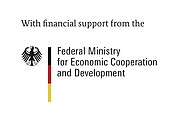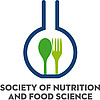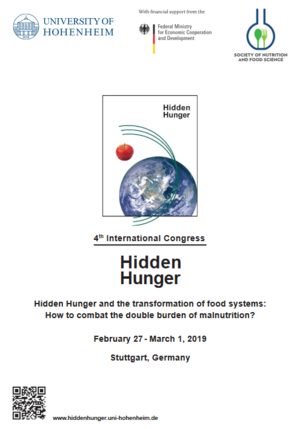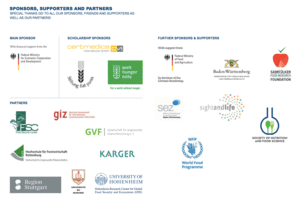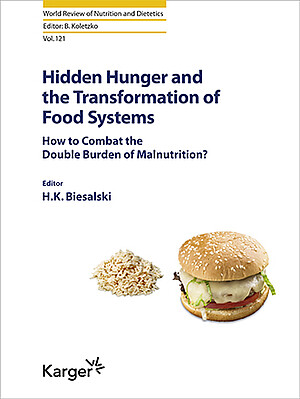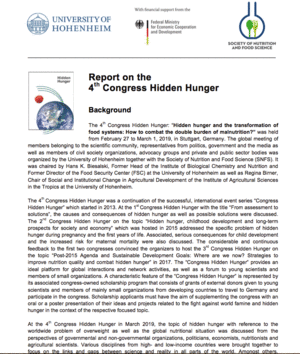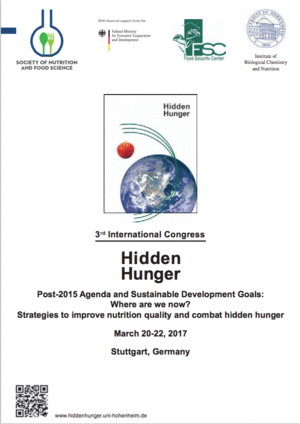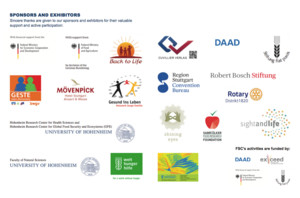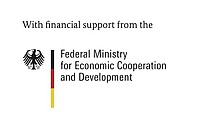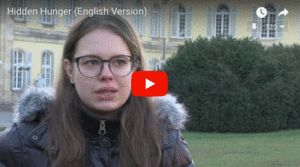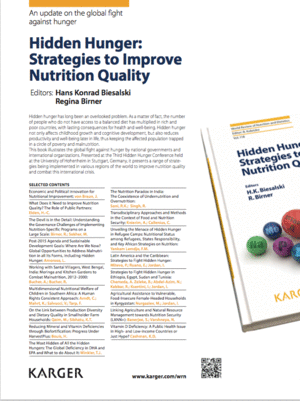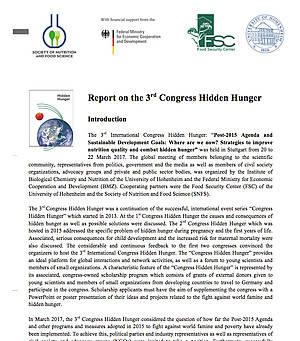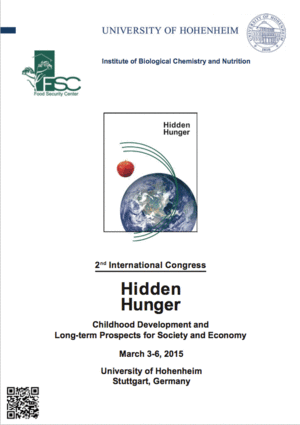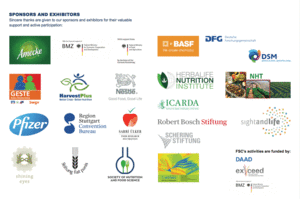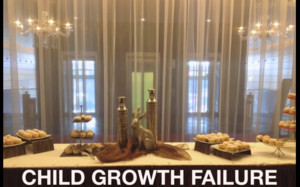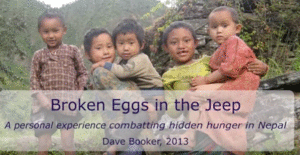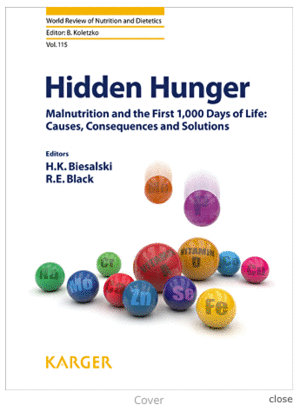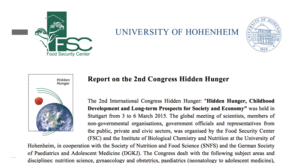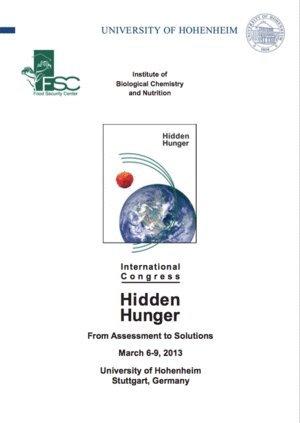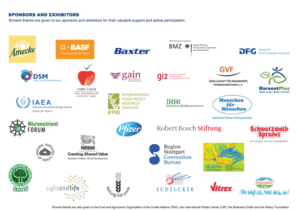Archive
4th International Congress Hidden Hunger:
Hidden hunger and the transformation of food systems: How to combat the double burden of malnutrition?
February 27 - March 1, 2019 / Stuttgart, Germany
The 4th Congress Hidden Hunger was a continuation of the successful, international event series "Congress Hidden Hunger" which started in 2013 in Stuttgart, Germany.
As in case of the previous congresses in this series, the 4th Congress Hidden Hunger brought together members of different disciplines: nutritionists, agricultural scientists, economists and sociologists. Moreover, the congress encouraged the dialogue between scientists, policy-makers and representatives of non-governmental organizations and the private sector. It was dedicated to review the available evidence on the double burden of malnutrition, present new research findings on underlying causes and consequences, feature innovative strategies and discuss the roles and responsibilities of governments, development organizations, civil society and the private sector in combating the double burden of malnutrition.
The "Congress Hidden Hunger" provides a platform for global interactions of members belonging to the scientific community, representatives from politics, government and the media as well as members of civil society organizations, advocacy groups and private and public sector bodies. The considerable and continuous feedback to the first three congresses convinced the organizers to host further congresses of the international event series "Congress Hidden Hunger".
Background:
During the past decade, the problem of hidden hunger has become increasingly recognized by the international development community. However, as developing countries enter a transformation of their food systems due to urbanization and industrialization, another malnutrition challenge is becoming increasingly important: overweight and obesity. The World Health Organization (WHO) has called this problem the “double burden of malnutrition”, which is “characterized by the coexistence of undernutrition along with overweight and obesity, or diet related non-communicable diseases, within individuals, households and populations, and across the life course.”
Nutritionists and development economists have recognized the coexistence of energy and micronutrient deficiency on the one hand and overweight/obesity on the other as a rising threat for developing countries. A coexistence of micro-nutrient deficiency and obesity can even be observed in high-income countries among groups with low socio-economic status (for more details see below). The Sustainable Development Goal 2 (SDG2) envisages to end all forms of malnutrition by 2030. However, there are still considerable knowledge gaps both regarding the underlying causes of the double burden of malnutrition and regarding its consequences. Moreover, there is an urgent need to better understand which strategies that can be used to effectively address the double burden problem of malnutrition. Therefore, the 4th Hidden Hunger Congress will focus on this problem.
A systematic review showed that the coexistence of undernutrition and overnutrition within the same household ranges worldwide between 0% and 27%, in particular affecting countries in Africa and Asia (Kosaka and Umezaki 2017). The fatal coincidence of stunting (reduced growth and impaired cognitive development) and obesity increases the risk of children suffering from non-communicable diseases (NCD) as adults or even as adolescents (e.g. diabetes, hypertension, metabolic syndrome). Children from low and middle income countries are primarily affected (Bates et al. 2017), where prevalence of stunting and overweight is between 0.3% and 11.7%. The problem is associated with the transformation of food systems in increasingly urbanized societies towards growing consumption of energy-dense but micronutrient-poor food. Together with low dietary diversity and the dominance of starchy food in the diet, this combination favors the development of malnutrition and obesity in children. Furthermore, a poor supply of vitamin A, vitamin D, folate, iron, zinc and iodine is evident. What has remained largely unrecognized is the fact that the coexistence of overnutrition and micronutrient deficiency continues to persist in high-income countries where it affects populations with low socioeconomic status (Min et al. 2018). For example, a poor supply of micronutrients (vitamin D, folate, iron, iodine) has been described in German toddlers and a large-scale study (253.000 children) in Brandenburg documented a decline in heights for children of unemployed parents or families living in poverty (Hilbig et al. 2015, Baten and Böhm 2009).
References:
Kosaka S, Umezaki M (2017). A systematic review of the prevalence and predictors of the double burden of malnutrition within households. Br J Nutr 117(8):1118-1127
Bates K, Gjonça A, Leone T (2017). Double burden or double counting of child malnutrition? The methodological and theoretical implications of stunting-overweight in low and middle income countries. J Epidemiol Community Health 71(8):779-785
Min J, Zhao Y, Slivka L, Wang Y (2018). Double burden of diseases worldwide: coexistence of undernutrition and overnutrition-related non-communicable chronic diseases. Obes Rev 19(1):49-61
Hilbig A, Drossard C, Kersting M, Alexy U (2015). Nutrient adequacy and associated factors in a nationwide sample of German toddlers. J Paediatr Gastroenterol Nutr 61(1): 130-137
Baten J, Böhm A (2009). Children’s height and parental unemployment: a large-scale anthropometric study on eastern Germany, 1994–2006. German Economic Review 11: 1-24
The 4th International Congress Hidden Hunger 2019 was organized by the Institute of Biological Chemistry and Nutrition at the University of Hohenheim and the Society of Nutrition and Food Science (SNFS). Cooperating partner was the Federal Ministry for Economic Cooperation and Development (BMZ).
Congress Chairs:
(WITHOUT ACADEMIC TITLES)
Hans K. Biesalski
Institute of Biological Chemistry and Nutrition
University of Hohenheim, Stuttgart, Germany
Regina Birner
Institute of Agricultural Sciences in the Tropics,
University of Hohenheim, Stuttgart, Germany
Congress Secretary/Project Management:
(WITHOUT ACADEMIC TITLES)
Jana Tinz
Institute of Biological Chemistry and Nutrition
University of Hohenheim, Stuttgart, Germany
Congress Office:
(WITHOUT ACADEMIC TITLES)
Jana Tinz
Institute of Biological Chemistry and Nutrition / Food Security Center (FSC)
University of Hohenheim, Stuttgart, Germany
Advisory Board:
(WITHOUT ACADEMIC TITLES)
Leslie Amoroso
Food and Agriculture Organization of the United Nations (FAO), Italy
Zulfiqar A. Bhutta
Hospital for Sick Children and SickKids Centre for Global Child Health, Canada
and Centre of Excellence in Women and Child Health, Aga Khan University, Pakistan
Francesco Branca
World Health Organization (WHO), Switzerland
Johanna Dwyer
School of Medicine and Friedman School of Nutrition Science and Policy, Tufts University, USA
Hanns-Christoph Eiden
Federal Office for Agriculture and Food (BLE), Germany
Almut Feller
BerufsVerband Oecotrophologie (Professional Association of Oecotrophology), Germany
Jan Frank
University of Hohenheim and Society of Nutrition and Food Science (SNFS), Germany
Heike Henn
Federal Ministry for Economic Cooperation and Development (BMZ), Germany
Philipp Keil
Stiftung Entwicklungszusammenarbeit Baden-Württemberg (SEZ), Germany
Stephan Krall
Deutsche Gesellschaft für Internationale Zusammenarbeit (GIZ) GmbH, Germany
Mathias Mogge
Welthungerhilfe e. V., Germany
Matin Qaim
Georg-August-University of Göttingen, Germany
Fatiha Terki
World Food Programme (WFP), Italy
Joachim von Braun
Center for Development Research (ZEF), Germany
Manfred Zeller
University of Hohenheim, Germany
Best Poster Award:
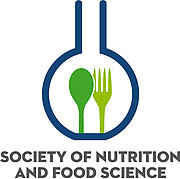 | The Society of Nutrition and Food Science (SNFS) awarded the three best poster presentations with a prize of ech 200 €. We are delighted to announce the three presenters below: T. Randrianajaina (1), J, Rambeloson Zo (1,2), M. Rakotondravelo (1), J. Rambeloson (3), E. Rambelontsalama, M. Rasolojaona, R. Seidel (2) (1: Concept Mihary, Antananarivo, Madagasikara, 2: FHI360, North Carolina, USA, 3: George Mason University, USA): “Tackling malnutrition by transforming an annual plague into a nutrition opportunity for families in Madagascar"
“Unfavorable change in vitamin A kinetics induced by iron deficiency is reversed by iron repletion in rats”
“The Potential Role of Baobab in Food Security in Kilifi and Kitui Counties of Kenya?”
|
Publications:
1.) Book:
For further info related to the book please click below:
2.) Summary Report:
To download the Summary Report please click below:
3rd International Congress Hidden Hunger:
Post-2015 Agenda and Sustainable Development Goals: Where are we now? Strategies to improve nutrition quality and combat hidden hunger
March 20-22, 2017 / Stuttgart, Germany
In March 2017, the 3rd Congress Hidden Hunger considered the question of how far the Post-2015 Agenda and other programs and measures adopted in 2015 to fight against world famine and poverty have already been implemented. To achieve this, political parties and industry representatives as well as representatives of civil society and advocacy groups (NGOs) were invited to take a position. Furthermore, successfully established projects and initiatives (such as the special initiative "One World – No Hunger" of the Federal Ministry for Economic Cooperation and Development (BMZ)) were presented at the congress.
Young scientists and members of small organizations had the opportunity to apply for a scholarship to participate in the congress. They were invited to supplement the event with a presentation of their ideas for cooperation and implementation of different measures in the fight against world famine. It was important that all participants presented and discussed the specific objectives of such measures and how they are to be regionally implemented.
The 3rd International Congress Hidden Hunger 2013 was organized by the Institute of Biological Chemistry and Nutrition at the University of Hohenheim and the Federal Ministry for Economic Cooperation and Development (BMZ). Cooperating partners were the Society of Nutrition and Food Science (SNFS) and the Food Security Center (FSC) at the University of Hohenheim.
Congress Chairs:
(WITHOUT ACADEMIC TITLES)
Hans K. Biesalski
Institute of Biological Chemistry and Nutrition
University of Hohenheim, Stuttgart, Germany
Reiner Doluschitz
Institute of Farm Management / Institute of Agricultural Policy and Markets / Food Security Center (FSC)
University of Hohenheim, Stuttgart, Germany
Jan Frank
Institute of Biological Chemistry and Nutrition
University of Hohenheim, Stuttgart, Germany
Congress Secretaries:
(WITHOUT ACADEMIC TITLES)
Donatus Nohr
Jana Tinz
Institute of Biological Chemistry and Nutrition
University of Hohenheim, Stuttgart, Germany
Congress Office:
(WITHOUT ACADEMIC TITLES)
Jana Tinz
Institute of Biological Chemistry and Nutrition / Food Security Center (FSC)
University of Hohenheim, Stuttgart, Germany
Advisory Board:
(WITHOUT ACADEMIC TITLES)
Robert E. Black
Johns Hopkins University, Bloomberg School of Public Health, USA
Andreas Blüthner
BASF SE, Germany
Hanns-Christoph Eiden
Federal Office for Agriculture and Food (BLE), Germany
Andrea Fadani
Foundation fiat panis, Germany
Almut Feller
BerufsVerband Oecotrophologie e.V. (Professional Association of Oecotrophology), Germany
Henning Knipschild
Federal Office for Agriculture and Food (BLE), Germany
Stephan Krall
Deutsche Gesellschaft für Internationale Zusammenarbeit (GIZ) GmbH, Germany
Klaus Krämer
Sight and Life Foundation, Switzerland
Mathias Mogge
Deutsche Welthungerhilfe e.V., Germany
Marie T. Ruel
International Food Policy Research Institute (IFPRI), USA
Noel W. Solomons
Center for Studies of Sensory Impairment, Aging and Metabolism (CeSSIAM), Guatemala
Joachim von Braun
Center for Development Research (ZEF), Germany
Klaus von Grebmer
International Food Policy Research Institute (IFPRI), USA
Bernhard Walter
Brot für die Welt – Evangelischer Entwicklungsdienst, Germany
Patrick Webb
Tufts University, Friedman School of Nutrition Science and Policy, USA
Jack Winkler
London Metropolitan University, UK
Ingrid Wünning-Tschol
Robert Bosch Foundation, Germany
Sincere thanks go to the sponsors and exhibitors for their valuable support as well as their active contribution!
FSC is part of the DAAD (German Academic Exchange Service) program "exceed" and supported by the Federal Ministry for Economic Cooperation and Development (BMZ) and the Foundation fiat panis.
Movie about Hidden Hunger:
Students from the University of Hohenheim specializing in Communication Science and Journalism made a film about the topic of Hidden Hunger. The leaders of the project were Bettina Ditzen and Rainer Bluthardt from the Institute of Communication Science of the University of Hohenheim.
We would like to thank the project team for its valuable work and commitment!
Best Poster Award:
 | The Society of Nutrition and Food Science (SNFS) awarded the three best poster presentations with a prize of up to 300 €. We are delighted to announce the three presenters below: Congratulations to the winners! |
Publications:
1.) Book:
For further info related to the book please click below:
2.) Summary Report:
To download the Summary Report please click below:
3.) Further publications:
http://news.abidjan.net/h/611785.html
http://news.abidjan.net/p/428274.html
Assmann-Stiftung:
Facebook: www.facebook.com/students4kids
Pressemitteilung: https://bildungsklick.de/bundeslaender/meldung/students4kids-auf-dem-3rd-international-hidden-hunger-congress/
DAAD (Deutscher Akademischer Austauschdienst):
Press release of the University of Hohenheim
2nd International Congress Hidden Hunger:
Hidden Hunger, Childhood Development and Long-Term Prospects for Society and Economy
March 3-6, 2015 / Stuttgart, Germany
The 2nd International Congress Hidden Hunger was a global meeting of scientists, field workers, members of NGOs and representatives from the government, public, private and civil sector. It focused on causes and consequences of Hidden Hunger during early development as well as on counter-strategies.
Topics included:
- Impact of malnutrition on intrauterine development and its consequences on long-term health
- Impact of Hidden Hunger on physical and cognitive development
- Consequences of Hidden Hunger for future society and economy
- Early detection of Hidden Hunger and options to intervene before and during pregnancy, lactation, complementary feeding, weaning and post-weaning period
Panel discussions with participants from high- and low-income countries focused on the links and gaps between science and reality in all parts of the world. The conference also brought together various disciplines to discuss Hidden Hunger under the perspectives of nutrition, gynecology/obstetrics, pediatrics from neonatology to adolescent medicine, social sciences, politics, economics, and agricultural sciences.
Background:
Adequate nutrition is a prerequisite for healthy growth and development, not only with respect to its quantity, but also its quality, which is defined by its micronutrient density. This plays an important role specifically from the time of conception until about the end of the second year of life. This so-called 1,000-Day-Window (including the important intrauterine period, the 200-Day-Window) is a highly vulnerable period for physical, motor and cognitive development, particularly susceptible to an inadequate supply of micronutrients. An inadequate supply of micronutrients, with or without adequate energy and protein supply, is defined as Hidden Hunger. The problem is that Hidden Hunger is frequently overlooked because of late manifestation of visible clinical symptoms. Poverty and poor education, in particular the lack of knowledge about adequate food intake during pregnancy, lactation and complementary feeding period, increase the risk of Hidden Hunger. Herewith, Hidden Hunger is not only a problem of low-income countries, but of high-income countries, too. In both groups of countries, the number of children living under poverty conditions and suffering from food insecurity is constantly rising. Recent studies revealed a clear effect of the socioeconomic status on the brain and subsequent cognitive development in children. Some of the micronutrients involved in brain development (e.g. iron, copper, zinc, iodine, selenium, vitamin A and D) play an important role in worldwide Hidden Hunger. Deficits of these micronutrients may negatively impact the future of affected children while reducing their physical and mental capacity for escaping poverty.
The 2nd International Congress Hidden Hunger 2015 was organized by the Institute of Biological Chemistry and Nutrition and the Food Security Center (FSC) at the University of Hohenheim. Cooperating partners were the Society of Nutrition and Food Science (SNFS) and the German Society of Pediatrics and Adolescent Medicine (DGKJ e.V.).
The congress was certified by the Landesärztekammer Baden-Württemberg with 6 CME credit points per day.
The parallel and side event HUNGER AND AFFLUENCE - A Science & Society Session of the Schering Stiftung on the topic of hunger in the affluent society - with the focus on "science meets culture" was organized by different artists of the Theater Rampe (Stuttgart, Germany), the University of Arts Zürich (Switzerland), and the Danish Arts Foundation (for further info see "The Look Back").
Congress Chair:
Prof. Dr. med. Hans Konrad Biesalski
Institute of Biological Chemistry and Nutrition
University of Hohenheim, Stuttgart, Germany
Congress Secretaries:
Prof. Dr. Donatus Nohr, Dipl. Biol. Jana Tinz
Institute of Biological Chemistry and Nutrition
University of Hohenheim, Stuttgart, Germany
Congress Office:
Dipl. Biol. Jana Tinz
Institute of Biological Chemistry and Nutrition / Food Security Center (FSC)
University of Hohenheim, Stuttgart, Germany
Advisory Board:
Prof. Dr. Regina Birner
Institute of Agriculture Economics and Social Sciences in the Tropics and Subtropics
University of Hohenheim, Stuttgart, Germany
Prof. Dr. med. Dr. h.c. Hansjosef Böhles (em.)
Department of Pediatrics,
Johann Wolfgang Goethe-University , Frankfurt/Main, Germany
M.Sc./MBA Susanne Braun
Life Science Center
University of Hohenheim, Stuttgart, Germany
Prof. Dr. med. Christoph A. Bührer
Department of Neonatology
Charité University Medical Center, Berlin, Germany
Dr. Hanns-Christoph Eiden
Federal Office for Agriculture and Food
Bonn, Germany
Prof. Dr. Jan Frank
Institute of Biological Chemistry and Nutrition, Division of Biofunctionality and Safety of Food
University of Hohenheim, Stuttgart, Germany
Prof. Dr. Franz Heidhues (em.)
Institute of Agricultural Economics and Social Sciences in the Tropics and Subtropics
University of Hohenheim, Stuttgart, Germany
M.Sc. Philipp Hildebrandt
Institute of Food Science and Biotechnology, FoodDACH
University of Hohenheim, Stuttgart, Germany
Prof. Dr. med. Berthold V. Koletzko
Dr. v. Hauner Paediatric Hospital
University Clinics Munich, Munich, Germany
Prof. Dr. med. Michael B. Krawinkel
Institute of Nutritional Science
Justus-Liebig-University, Gießen, Germany
Prof. Dr. med. Christian F. Poets
Department of Neonatology
University of Tübingen, Tübingen, Germany
Dr. Veronika Scherbaum
Competence Center Gender and Nutrition
University of Hohenheim, Stuttgart, Germany
Prof. Dr. Joachim von Braun
Center for Development Research (ZEF)
University of Bonn, Department of Economic and Technological Change, Bonn, Germany
Prof. Dr. Manfred Zeller
International Food Policy Research Institute (IFPRI) / Harvest Plus, Kampala, Uganda
Prof. Dr. med. Michael B. Zimmermann
Swiss Federal Institute of Technology (ETH) Zurich
Department of Health Sciences and Technology (D-HEST), Zurich, Switzerland
Sincere thanks go to the sponsors and exhibitors for their valuable support as well as their active contribution!
FSC is part of the DAAD (German Academic Exchange Service) program "exceed" and supported by the Federal Ministry for Economic Cooperation and Development (BMZ) and the Foundation fiat panis.
Parallel and side event: Science meets Culture
HUNGER AND AFFLUENCE - A Science & Society Session of the Schering Stiftung on the topic of hunger in the affluent society
Hunger in Europe is largely hidden. Hunger has been the driving force behind European civilization, feeding our myths and tales. But for the last 60 years hunger played no role in our public discourse, neither in politics nor culture. Once a unifying, global experience, hunger has now been relegated to the economical and geographical margins. What happens to a culture that is built on hunger but has lost it?
As an addition to the International Congress Hidden Hunger 2015 the program approached the role of hunger and affluence from the perspective of cultural studies and artistic practice. These perspectives enhance the natural, medical and social science perspectives of the Congress Hidden Hunger 2015. The cultural/aesthetic aspects of food are vital for understanding and dealing with nutritional developments globally. Food is cultural and so is hunger.
HUNGER AND AFFLUENCE invited a group of 8 artists and cultural scientists to participate in the following public events:
| Publishing Hunger | Artist Andreas Liebmann (D) together with students from the University of the Arts Zürich (CH) gathered statements from congress guests on their individual hunger. These statements were reformulated and mirrored back to the plenum via video projection and sound. Date & Time: Whole days of the congress: Tuesday, March 3 until Thursday, March 5, 2015 Location: Congress venue - Mövenpick Hotel Stuttgart Airport & Messe
» Blog: "Conference learning from surprising questions" » Blog: "Publishing Hunger" |
| HotSPots/Krisenherd 2015 | A dinner-debate. Under the guidance of artist Wanja Saatkamp (D) 40 guests participated in creating a dinner together while talks were given by two invited speakers: a scholar from the HIDDEN HUNGER congress and an artist. The audience sat together at one long table and created and shared thoughts and food over the course of a meal. Date & Time: Thursday, March 5 / 7.00 pm Location: Theater Rampe |
| Two Seminars on Hunger and Affluence | Five international cultural scholars and artists – Cultural historian Prof. Frederike Felcht (Ludwig-Maximilians-University, Munich, and J.-W.-Goethe-University, Frankfurt/Main, D), writer Yemisi Ogbe (Lagos, Nigeria); visual artist Ulf Aminde (Berlin, D), Cultural Anthropologist Sebastian Schellhaas (J.-W.-Goethe-University, Frankfurt/Main, D), researcher Gervaise Debucquet (Nantes, France) – presented introductory statements or excerpts of their work and discussed the role of hunger in affluent societies and the ties between cultural expression and nutrition. Date & Time: Friday, March 6, 2015 / 2.00 pm and 4.00 pm Location: Congress venue - University of Hohenheim, Euroforum |
| NOMA - Luxury Face (pt 2) | Performance and installation by Andreas Liebmann, Dorte Holbeck (DK) and Derek Lesher (DK) about indulgence and malnutrition. The installation was developed and presented several weeks earlier in Copenhagen, home of the restaurant Noma, voted the world's best restaurant in 2014. Date & Time: Friday, March 6, 2015 / 8.00 pm Location: Theater Rampe |
The program was an official part of the Congress Hidden Hunger 2015 program and accessible for all congress guests as well as for general public. The Seminars were held in a central venue of the University Hohenheim. They were open to the public. The presentations at Theater Rampe aimed at creating a social and geographic link between the congress, the scientific community and the cultural scene of the city of Stuttgart.
Please click here for info as to the artists
Video presentation: "Broken Eggs in the Jeep"
The changing landscape of nutrition interventions in contexts of rapid urbanization and infrastructure development: Nepal as a case study
Presented by David Booker (Himalaya Hilfe Freiburg e.v., Germany) and Keith P. West (John`s Hopkins Bloomberg School of Public Health, Baltimore, USA) on Thursday, March 5, 2015
Best Poster Award
The congress team awarded the three best poster presentations with a prize of up to 300 €. We are delighted to announce the three presenters here:
First Poster Prize |
Second Poster Prize |
Third Poster Prize Authors: M.R.R. Talukder, M. Rahman, D.M.D. Hogue Poster Title: Antenatal use of iron supplement in geographically diverse areas of Bangladesh: lessons for maternal health interventions |
|
Publications:
1.) Book:
For further info related to the book please click below:
2.) Summary Report:
To download the Summary Report please click below:
3.) Publications in the media:
Journal Articles (in English):
"How to combat hidden hunger?" by Beate Wörner, Rural21, 24.03.2015 (also see here)
"International Nutrition Conference: hunger and malnutrition a global challenge" by Andrea Sonntag, Rural21, 20.12.2014 (also see here)
Radio Contributions (in German):
"Vitamin A aus Mais kommt im Körper an" by Katrin Zöfel, Deutschlandfunk, 27.05.2015
"Das Mysterium Eisenmangel" by Katrin Zöfel, Deutschlandfunk, 16.04.2015
"Nahrungsergänzungsmittel bei Frühchen" by Katrin Zöfel, Deutschlandfunk, 09.03.2015
"Auf den Tisch kommt, was günstig ist" by Thomas Wagner, Deutschlandfunk, 06.03.2015
"Versteckter Hunger" by Thomas Wagner, Deutschlandfunk, 04.03.2015
"Mangelernährung und Übergewicht - Hunger im 21. Jahrhundert hat ein neues Gesicht" by Sabine Schütze, SWR1, 20.11.2014
Newspaper Articles (in German):
"Hunger gibt es, wo man ihn nicht vermutet" by Tanja Volz, Stuttgarter Zeitung, 04.03.2015
Press Releases (in German):
"Internationaler Kongress zum Thema unsichtbarere Hunger" by BLE (Bundesanstalt für Landwirtschaft und Ernährung), 12.03.2015
Press Releases (in English):
"Making HIdden Hunger Visible: Childhood Development and Long-term Prospects for Society and Economy" by SEARCA, April 2015
"Africa: Data gaps make malnutrition too easy to ignore" by Andrea Rinaldi, 16.03.2015
"Data gaps make malnutrition too easy to ignore" by IFPRI, 16.03.2015
"Putting agricultural biodiversity back on the nutrition agenda" by kkeeton, CGIAR, March 13, 2015
"Save the date. Because being full isn`t enough"
by F. Klebs, University of Hohenheim, December 8, 2014
"Hidden Hunger Congress: Major Conference on malnutrition in Poor and Rich Countries"
by F. Klebs, University of Hohenheim
1st International Congress Hidden Hunger:
From Assessment to Solutions
March 6-9, 2013 / University of Hohenheim, Stuttgart, Germany
The 1st International Congress Hidden Hunger had three objectives:
- To create awareness of the global problem of Hidden Hunger
- To get scientific issues on the agenda of policy makers, academics, politicians and business leaders
- To discuss solutions to address worldwide micronutrient deficiencies.
Scientists from different areas, field workers, members of non-governmental organizations (NGOs) and representatives from administration, management and policy were invited to discuss the different topics for four days at the University of Hohenheim located in Stuttgart-Plieningen, Germany.
Attention was given to Africa and Asia as well as North America and Europe.
Hidden Hunger is an increasing problem even in the developed countries, whose potential negative consequences on long-term health are often overlooked and underestimated.
The 1st International Congress Hidden Hunger 2013 was organized by the Institute of Biological Chemistry and Nutrition and the Food Security Center (FSC) at the University of Hohenheim.
Congress Chair:
Prof. Dr. med. Hans Konrad Biesalski
Institute of Biological Chemistry and Nutrition
University of Hohenheim, Stuttgart, Germany
Congress Secretary:
Prof. Dr. Donatus Nohr
Institute of Biological Chemistry and Nutrition
University of Hohenheim, Stuttgart, Germany
Congress Office:
Dr. Claudia Wicke, Dipl. Biol. Jana Tinz
Institute of Biological Chemistry and Nutrition
University of Hohenheim, Stuttgart, Germany
Local Organizing Committee at the University of Hohenheim:
Prof. Dr. Folkard Asch
Institute of Plant Production and Agroecology in the Tropics and Subtropics
Prof. Dr. Regina Birner
Institute of Agricultural Economics and Social Sciences in the Tropics and Subtropics (490)
Prof. Dr. Stephan C. Bischoff
Institute of Nutritional Medicine / Prevention
Dr. Ursula Eid
Parliamentarian State Secretary (retired)
Prof. Dr. Harald Grethe
Institute of Agricultural Policy and Agricultural Markets
Prof. Dr. Dr. Franz Heidhues
Institute of Agricultural Economics and Social Sciences in the Tropics and Subtropics
Prof. Dr. Iris Lewandowski
Institute of Crop Science
Prof. Dr. Uwe Ludewig
Institute of Crop Science
Prof. Dr. Joachim Müller
Institute of Agricultural Engineering
Prof. Dr. Nanette Ströbele
Institute of Nutritional Medicine
Dr. Veronika Scherbaum
Competence Center Gender and Nutrition
Dr. Detlef Virchow
Food Security Center
Prof. Dr. Manfred Zeller
Institute of Agricultural Economics and Social Sciences in the Tropics and Subtropics
International Board and Program Commitee:
Prof. Dr. Lindsay Allen
USDA, ARS Western Human Nutrition Research Center
University of California, Davis, USA
Prof. Dr. Zulfiqar A. Bhutta
AGA KHAN University, Karachi, Pakistan
Prof. Dr. Dr. Joachim von Braun
ZEF - Zentrum für Entwicklungsforschung, Center for Development Research
University of Bonn, Department of Economic and Technological Change, Bonn, Germany
Prof. Dr. Parul Christian
Department of International Health, Johns Hopkins Bloomberg School of Public Health, Baltimore, USA
Prof. Dr. Adam Drewnowski
UW Center for Obesity Research, University of Washington, Seattle, USA
Prof. Dr. Charles Godfray
University of Oxford, Department of Zoology, Oxford, UK
Prof. Dr. John Hoddinott
Poverty Health and Nutrition Division, International Food Policy Research Institute, Washington DC, USA
Prof. Dr. John Humphrey
Institute of Development Studies, Brighton, UK
Janet R. Hunt
Division of Human Health, International Atomic Energy Agency, Vienna, Austria
Prof. Dr. Timothy Johns
School of Dietetics and Human Nutrition, McGill University, Ste. Anne de Bellevue, Canada
Prof. Dr. Eileen T. Kennedy
Tufts University, Friedman School of Nutrition and Policy, Boston, USA
Prof. Dr. Berthold Koletzko
Ludwig-Maximilians Universität Munich
Division of Metabolic Diseases and Nutritional Medicine, Dr. v. Hauner Children`s Hospital, Munich, Germany
Dr. Klaus Krämer
SIGHT AND LIFE, Basel, Switzerland
Prof. Dr. Ruth K. Oniang`o
Food Security and Nutrition Thematic Working Group, Nairobi, Kenya
Prof. Dr. Matin Qaim
Lehrstuhl Welternährungswirtschaft und Rurale Entwicklung, Department für Agrarökonomie und Rurale Entwicklung, Göttingen, Germany
Dr. Marie T. Ruel
International Food Policy Research Institute, Washington D.C., USA
Prof. Dr. Patrick Webb
Tufts University, Friedman School of Nutrition and Policy, Boston, USA
Prof. Dr. Keith West
John`s Hopkins Bloomberg, School of Public Health, Baltimore, USA
Sincere thanks go to the sponsors and exhibitors for their valuable support as well as their active contribution!
FSC is part of the DAAD (German Academic Exchange Service) program "exceed" and supported by the Federal Ministry for Economic Cooperation and Development (BMZ) and the Foundation fiat panis.
New Platform:
Participants of the 1st International Congress Hidden Hunger 2013 called for a better communication between scientists, policy makers, politicians, NGOs, and local field workers world-wide. It is urgently necessary to create a broad database for use in future fight against Hidden Hunger.
For this purpose, we developed a new website which includes an overview of research projects from allover the world. Each and everyone has possibility to add research projects to it. Furthermore, the website offers a platform for exchange of study results, experiences, observations, reflections and ideas. Later on, there will be a chatroom in which cost-free registered persons may contact project managers or each other.
The address of the new website is: www.nutri-matrix.org
Publications:
1.) Publication in the journal Food Security by:
Springer-Verlag GmbH www.springer.com
Biesalski HK (2013). First International Conference on Hidden Hunger, Hohenheim, Stuttgart, Germany, March 6-9, 2013. Food Security 5(3): 457-473
2.) The congress report has also been published online in the journal Annals of Nutrition and Metabolism by:
KARGER Medical and Scientific Publishers www.karger.com
Biesalski HK (2013). International Congress Hidden Hunger, March 5-9, 2013, Stuttgart-Hohenheim, Germany. Ann Nutr Metab 2013;62:298-302 (DOI: 10.1159/000351078)
» Please click here for manuscript
Please note that only single downloads are permitted for personal and private scientific use!
© For permitted use only. Any further distribution of this pdf requires written permission from S. Karger AG Basel and may be subject to a permission fee.


